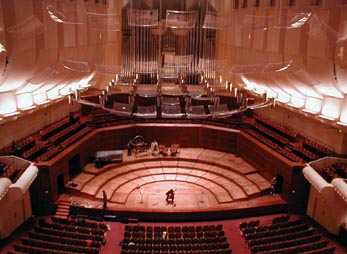
Jamie Bell onstage at Davies Hall

Jamie Bell onstage at Davies Hall
Sammi Madison from the Education department of the
Symphony invited the Teacher Institute to teach a class at Symphony
Hall.
We accepted.
Modesto and I put together the following workshop.
Part 1 Jamie Bell
We began by listening to Jamie Bell play solo classical guitar. As the notes written by Villa Lobos and superbly performed by Jamie filled the hall, teachers sitting in seats spread around the hall sampled the sound.
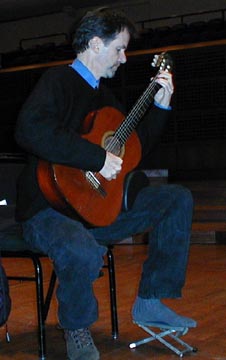
After the music ended we gathered together to report that to our amazement the large hall allowed us to hear the guitar quite clearly from most seats. The central orchestra seats and the front rows of the mezzanines were particularly good places to hear the music in all of its glory.
Jamie reported that he loved the feedback from the hall, he could tell that he did not need to play particularly loudly.
Al, the electrician, answered our questions and operated the "canopy" the array of acrylic panels that move up and down to adjust the sound of the Hall. While Jamie played his fourth piece Al raised the panels from the solo guitar position to the symphony position. Teachers reported that the loudness of the guitar decreased at the back of the hall.
Al also lowered one of the panels for our visual inspection. It was made from thick acrylic. One electric motor raises and lowers the panel, two other motors tip it front-to-back and side-to-side. All of the panels are controlled by a Macintosh computer. He reported that one day Maestro Blomstedt rode in one of the panels as it was raised.
Nancy Koch reported that on opening day at Symphony Hall she could not hear the symphony from the center of the orchestra seats. Later the hall received a 10 million dollar acoustic upgrade that produced the improved acoustics we heard during our lesson.
Part 2 Teachers as Stars
Modesto had teachers build super pinna, large construction paper ears to change their perception of sound then we invited teachers to use their new ears to listen to each other.

We invited teachers to play their instruments on stage at Symphony Hall.
They played: Krumhorn, recorder, saxophone, xylophone, violin, trombone, drum, and thumb piano. They also sang. Meanwhile we roamed the hall measuring sound levels with decibel meters and listening to how the sounds changed at different positions in the hall.
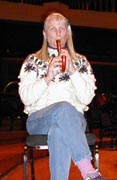


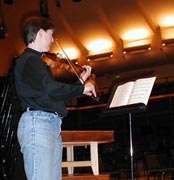

Now each teacher can say "I played on stage at Davies Symphony Hall!"
We discussed the science of each instrument here are some basic explorations of musical sound.
How sound bounces off the open end of a tube.
Harmonic Phonecord, observe how standing waves create harmonics of instruments.
Slinky in Hand, a study of longitudinal waves in wind instruments.
Vertical Slinky, the standing waves in a tube closed at one end.
Straw Oboe, simple experiments with a musical straw.
Part 3 More Science
Paul played his aluminum rod and investigated interference patterns in the hall from a loud source of single frequency sound.
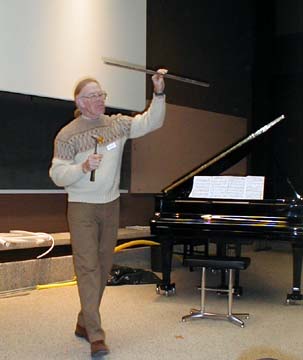
Modesto had the teachers build and play "harmonicas" using spring type clothes pins , masking tape and rubber bands.

Take apart a spring type clothes pin. Put the two flat faces together.

Wrap two turns of 1/2 inch wide blue masking tape around all four ends of the wood clip parts. (Blue of course because this harmonica is going to play the blues.)

Stretch a rubber band around one pin then twist it and use it to hold together both.

Blow through the gap between the pins and the rubber band will vibrate making sounds.

The loop of rubber band wraps around the outside and holds the
whole thing together.
Modesto then conducted a symphony of harmonicas.
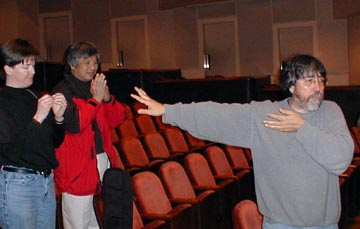
Paul then showed the teachers how to use decibel meters to measure the loudness of sounds.
At the end of the day we gave flowers and a round of applause to the star of the day, Sammi.
|
Scientific Explorations with Paul Doherty |
|
27 Feb 2001 |